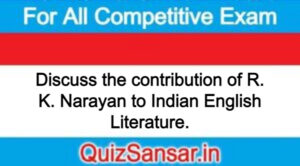
Discuss the contribution of R. K. Narayan to Indian English Literature.
Discuss the contribution of R. K. Narayan to Indian English Literature.
Ans.
R. K. Narayan is another celebrated Indian novelist writing in English. He enjoys a unique position in the crowded literary scene of Indian fiction. He is undoubtedly the master of portraying the socio-economic aspects of the ordinary Indian families and idiosyncrasies of human which form the crux of his novels. Most of Narayan’s novels are set in the background of Malgudi. Critics like Graham Greene feel that through Malgudi they could vividly understand the Indian experience. Narayan’s evocation of small town life and its experience through the eyes of the endearing child protagonist. Swaminathan in Swami and Friends is a good sample of his writing style. Simultaneous with Narayan’s pastoral idylls, a very different writer Mulk Raj Anand, was similarly gaining recognition for his writing set in rural India, but his stories were harsher and engaged, sometimes brutally, with division of caste, class and religion. If Anand’s art is committed to expose social injustice, economic exploitation and the plight of the suppressed castes and classes in India while Raja Rao’s interest lies in exploring the spirit essence of India, an ideological movement of Narayan’s work is much less discernible. Narayan’s style is much admired for his simplicity. His subtle use of ironic humour explores the oddities of human nature juxtaposing it with a dose of harmless humour. His fiction revolves around the imaginary sleepy South Indian town of Malgudi but expresses an outlook which has universal appeal. His famous novels are Bachelor of Arts and The Painter of Signs (1933), Swami and Friends (1935). The English Teacher (1945), Waiting for Mahatma (1955). The Guide (1958), The Sweet Vendor (1967). The vividness in character portrayal is balanced by ironic humour, which is his characteristic style. His writing has stretched seven decades and occupies a remarkable position in the history of Indian English fiction. Narayan has gained mastery of the art of portraying characters and nuances of the English language.
-
Write the critical appreciation of the poem No. 12 entitled Far Below Flowed.
-
Write the critical appreciation of the poem No. 11 entitled Leave this Chanting.






